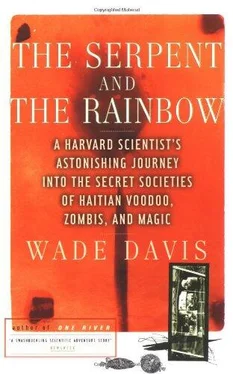Wade Davis - The Serpent and the Rainbow
Здесь есть возможность читать онлайн «Wade Davis - The Serpent and the Rainbow» весь текст электронной книги совершенно бесплатно (целиком полную версию без сокращений). В некоторых случаях можно слушать аудио, скачать через торрент в формате fb2 и присутствует краткое содержание. Год выпуска: 1985, Издательство: Simon & Schuster, Жанр: Старинная литература, на английском языке. Описание произведения, (предисловие) а так же отзывы посетителей доступны на портале библиотеки ЛибКат.
- Название:The Serpent and the Rainbow
- Автор:
- Издательство:Simon & Schuster
- Жанр:
- Год:1985
- ISBN:нет данных
- Рейтинг книги:5 / 5. Голосов: 1
-
Избранное:Добавить в избранное
- Отзывы:
-
Ваша оценка:
- 100
- 1
- 2
- 3
- 4
- 5
The Serpent and the Rainbow: краткое содержание, описание и аннотация
Предлагаем к чтению аннотацию, описание, краткое содержание или предисловие (зависит от того, что написал сам автор книги «The Serpent and the Rainbow»). Если вы не нашли необходимую информацию о книге — напишите в комментариях, мы постараемся отыскать её.
The Serpent and the Rainbow — читать онлайн бесплатно полную книгу (весь текст) целиком
Ниже представлен текст книги, разбитый по страницам. Система сохранения места последней прочитанной страницы, позволяет с удобством читать онлайн бесплатно книгу «The Serpent and the Rainbow», без необходимости каждый раз заново искать на чём Вы остановились. Поставьте закладку, и сможете в любой момент перейти на страницу, на которой закончили чтение.
Интервал:
Закладка:
“Of course it was someone in the family, that is certain,” the man told us. “But you’ll never know what he did unless you can speak with the one who judged him.”
“But the houngan said that the tribunal was never summoned,” Rachel replied, leading him on deliberately.
“There must be a tribunal in a case like that,” the cousin insisted. “They must call the dead. Otherwise they cannot set the trap.”
“To take his soul?” I asked, remembering what Clairvius had told us at the mission.
“They must.”
“His sister said the bokor passed a coup l’aire,” Rachel said.
“No. They wanted the body for work. Only a coup poudre could bring him down.”
“Coup poudre?” I looked toward Rachel.
“A magical powder,” she explained.
The cousin was uncertain what was in it. A large lizard called the agamonty perhaps, and apparently two toads, the crapaud bouga , and another called the crapaud de mer , the sea toad.
“Where is the poison placed?”
“There is no poison,” he answered. “Narcisse came out of the ground. A poison would have left him where he lay.” The cousin looked perplexed, and suddenly I understood and felt terribly foolish. I had been asking for a poison, but what I called a poison they called a trap or a coup poudre. For them what created a zombi was not a drug but a magical act.
It was two in the morning before the other guests left the Peristyle de Mariani, and Rachel went inside, leaving her father and me alone on the terrace. In the wake of the ceremony and the ebullient conversation that invariably followed, there was a welcome stillness that allowed one to notice things, like the fragrance of the lemon trees, or the high whistle of the fruit bats.
“You are not in your plate tonight,” Max said, drawing me back into his own realm of words. A bat swept beneath the roof of the peristyle and in an instant was gone.
“Perhaps,” I said offhandedly.
“Do you want a drink?”
“If you do. Rum on ice.”
“How’s the work?”
“It goes. Rachel didn’t tell you?”
“Some of it. They seem to be quite a pair.”
“Ti Femme?”
“And the other one.”
“Max, somebody has it all wrong.”
“What do you mean?”
“Ti Femme wasn’t innocent. People hated her. And Narcisse’s own sister tried to throw him out of the village, after not having seen him for eighteen years.”
“Probably she was afraid of him.”
“How can you be afraid of something that has no will?”
Beauvoir had started to laugh, but what I said stopped him. His face turned like a mask into a different pose.
“And how,” I continued, “can a being without will deliberately choose to kill someone? That, according to Narcisse, is how they gained their freedom. It doesn’t make sense.”
“You don’t believe him?”
“I don’t believe he was an innocent victim. Neither of them. Narcisse said there was a judgment, so did his cousin.”
Beauvoir didn’t say anything for several minutes, and when he did there was an unfamiliar edge to his voice. “You spoke to his sisters?”
“Just the tall one, Angelina. We saw the others some time ago.”
“What did you make of her?”
“Powerful, totally in charge. No love lost for her brother.”
“Nothing peculiar? Think about it.”
“No.” I paused for some time. “Except, I suppose, when I asked to photograph the family.”
“And?”
“She was the only one to change her dress.”
“So you did notice.”
“Yes, but I don’t …”
“She is a queen, and you surprised her.” I began to interrupt again, but he didn’t let me. He lifted his drink and the light caught the edge of the glass.
“To understand Haiti,” he said, “you must think of a glass of water. You cannot avoid touching the glass, but it is just a means of support. It is the water that slakes your thirst and it is the water, not the glass, that keeps you alive.
“In Haiti the glass consists of the Roman Catholic church, the government, the National Police and army, the French language, and a set of laws invented in Paris. Yet when you think of it, over ninety percent of the people do not understand, let alone read, French. Roman Catholicism may be the official religion, but as we say the nation is eighty-five percent Catholic and one hundred and ten percent vodoun. Supposedly we have Western medicine, but in a country of over six million, there are but five hundred physicians, and only a handful of these practice outside of the capital.
“No, from the outside Haiti may appear to be like any other forlorn child of the Third World struggling hopelessly to become a modern Western nation. But as you have seen, this is just a veneer. In the belly of the nation there is something else going on. Clairvius Narcisse was not made a zombi by some random, criminal act. He told you he was judged. He spoke about the masters of the land. Here he did not lie. They exist, and these are the ones you must seek, for your answers will only be found in the councils of the secret society.”
6
Everything Is Poison, Nothing Is Poison
I COULD SEE THE horizon stained by the sea, and the first shafts of light to the east. The air was cool and serene. It was a special time when the city shifted its mood, when the people emerged as the night angels fled, and the light made the buildings blush.
I still didn’t know his name, nor did I want to. He had a way of appearing at the strangest moments, always in linen, the same black cane in his hand, a jester’s baton, tapping the alabaster steps of the hotel.
“Ah, my young friend, you do not sleep.”
“Not tonight. I am just in.”
“And how fares your hunt?” I had told him nothing of my work. “I see by your expression. A shame. Mine, too, I’m afraid. A sordid commerce, trading one’s dollars for dreams. You could do better among the women of the Carrefour Road.”
His thin fingers plucked a tired rose from his lapel and discarded it on the table beside me. Once I had seen him in the bar of the hotel passing out copies of an article about himself in an American midwestern newspaper. It was ironic to see someone who exuded such self-importance striving so obviously for notoriety. Like the entire nation he was hungry for recognition. Yet it was he who, one afternoon with the heat rising off the veranda, had told me, “The world is not after Haiti as so many of us feel. The cold truth is the world’s indifference, and if there is one thing a Haitian hates it is to be inconsequential. It does not matter what is said about you, as long as you are the subject of conversation. Perhaps at some international soiree idle chatter passes to Haiti, but I doubt it.” One wanted to avoid him, yet in a country where the truth is taken so lightly, casually, he was irresistible.
When he was gone I moved to the edge of the veranda and looked out over the city. It was hard to believe that in a few hours the heat and glare of the sun would be difficult to bear.
Marcel Pierre was the only person I knew capable of making the zombi poison. In the three weeks since we had left his hounfour I had not, as promised, tested his preparation on an enemy. I had, however, learned something about the man. According to a number of informants Marcel Pierre was an early and loyal follower of François Duvalier, and a notorious member of the Ton Ton Macoute, the rural militia that Duvalier established to safeguard his regime. Apparently during the terrible days of the early 1960s, when to consolidate his revolution Duvalier killed hundreds of the mulatto elite, Marcel had used his authority to extort information from the traditional houngan. Although many of the houngan were themselves members of the Ton Ton Macoute, few could match Marcel Pierre’s ruthlessness. In exchange for protection from his gang, they reluctantly took him into their fold and shared certain secrets. Eventually Marcel’s abuses became intolerable, and he himself fell victim and was severely poisoned. Though he barely survived, the poison left him permanently scarred. Now close to twenty years later, his reputation was mixed. Some said he had repented and become a legitimately initiated houngan; others described him as a houngan macoute , a charlatan who lacks true spiritual knowledge. Still others, perhaps the majority, dismissed him as a lowly malfacteur , an evildoer, just as the BBC had done.
Читать дальшеИнтервал:
Закладка:
Похожие книги на «The Serpent and the Rainbow»
Представляем Вашему вниманию похожие книги на «The Serpent and the Rainbow» списком для выбора. Мы отобрали схожую по названию и смыслу литературу в надежде предоставить читателям больше вариантов отыскать новые, интересные, ещё непрочитанные произведения.
Обсуждение, отзывы о книге «The Serpent and the Rainbow» и просто собственные мнения читателей. Оставьте ваши комментарии, напишите, что Вы думаете о произведении, его смысле или главных героях. Укажите что конкретно понравилось, а что нет, и почему Вы так считаете.












